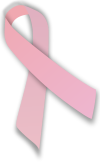 Women whose lives have been touched by the breast cancer experience of a friend or relative are more acutely attuned to their own risk for the disease and are taking action to protect themselves, according to a new national opinion poll by The University of Texas M. D. Anderson Cancer Center and Prevention magazine.Yet against a backdrop of unprecedented public awareness and despite the fact that an estimated 40,000 America women will lose their lives to breast cancer this year, 69 percent are largely unaware that regular exercise provides protection against the disease and 61 percent do not realize that being overweight or obese increases breast cancer risk. Most women (84 percent) do know, however, that taking hormone therapy increases risk even as it relieves symptoms of menopause.
Women whose lives have been touched by the breast cancer experience of a friend or relative are more acutely attuned to their own risk for the disease and are taking action to protect themselves, according to a new national opinion poll by The University of Texas M. D. Anderson Cancer Center and Prevention magazine.Yet against a backdrop of unprecedented public awareness and despite the fact that an estimated 40,000 America women will lose their lives to breast cancer this year, 69 percent are largely unaware that regular exercise provides protection against the disease and 61 percent do not realize that being overweight or obese increases breast cancer risk. Most women (84 percent) do know, however, that taking hormone therapy increases risk even as it relieves symptoms of menopause.
These are among the major findings of a national opinion poll of 800 women, age 30+, hitting newsstands today as part of a Prevention October issue special report, “Your Best Breasts,” which features cutting-edge breakthroughs in detection and treatment (www.prevention.com/yourbestbreasts). The poll surveyed women about their perceived risk for breast cancer, the extent to which they believe environmental factors impact their risk and, overall, their sense of control over the disease.
The American Cancer Society estimates that 182,460 women will be diagnosed with breast cancer in the United States in 2008.1 Breast cancer is the second most common cause of cancer death in women generally-and the number one cause of cancer death in Hispanic women.2 One in eight women will be diagnosed with breast cancer during her lifetime3.
- The survey also found:
When breast cancer hits closer to home – as it did for 57 percent of those polled – women expressed greater awareness of, and concern about, risk factors, than those who didn’t have a personal connection, including obesity, poor nutrition, hormone therapy and lack of exercise. In addition, these women say they are more likely to seek out healthy alternatives such as purchasing organic foods and natural personal care products. - Â Some women believe that the following environmental factors could increase their breast cancer risk: air pollution (32 percent), artificial additives (25 percent), pesticides used in the home or garden (23 percent) and artificial sweeteners (22 percent). Researchers suspect some of these elements of modern life may raise breast cancer risk but can’t quantify it. Scientists are suspicious of air pollution because some studies suggest it plays a role in childhood cancers and breast cancer. And a red flag has gone up about the possible effects of pesticides because animal studies reveal pesticides get into fat cells and disrupt estrogen.
- The importance of screening has penetrated the national consciousness: The great majority of 45-64 year-old women polled (88%) reported that they’d had a mammogram. However, more than one quarter of that group hadn’t had the screening in at least two years, even though national guidelines recommend an annual mammogram for all women over 40. Of greater concern: Twelve percent of women 45-64 have never had a mammogram. Among this group, 11 percent say their doctor never ordered one and nearly half expressed concern about the procedure being painful (47 percent) or too expensive (47 percent).
“The poll shows that women who know someone with breast cancer may not be taking a fatalistic view of the disease. On the contrary, it may be inspiring more healthy behaviors and a more fighter-like attitude toward preventing breast cancer,” said Jennifer Irvin Vidrine, Ph.D., clinical psychologist and assistant professor, Department of Health Disparities Research at M. D. Anderson, and lead survey designer and analyst.
Prevention editor-in-chief Liz Vaccariello said, “We were very surprised to find such low level concern about getting breast cancer. It may be that women feel confident of their ability to beat the disease due to advances in early detection and treatment.”
Findings from this poll expand on what is known about women’s attitudes and behaviors toward cancer gained from the 2007 M. D. Anderson-Prevention national survey, which assessed women’s knowledge, fears and sense of control over cancer. Findings from both national polls can be found at http://www.mdanderson.org and http://www.prevention.com/breastpoll.
Source:The University of Texas M. D. Anderson Cancer Center via Newswise
